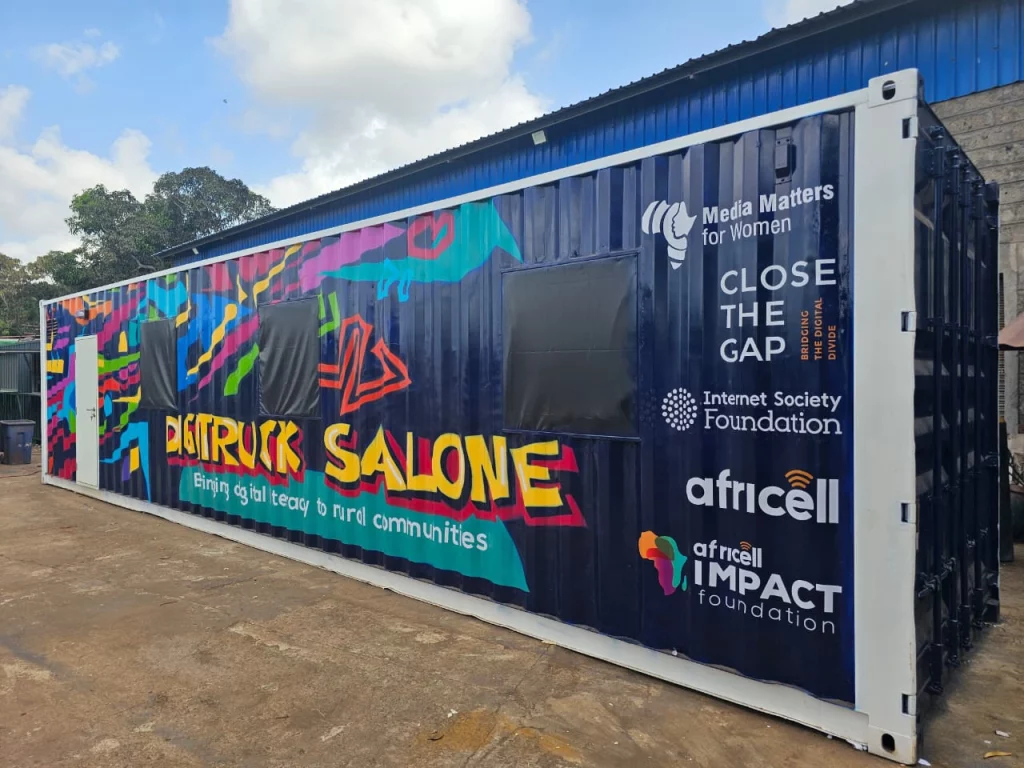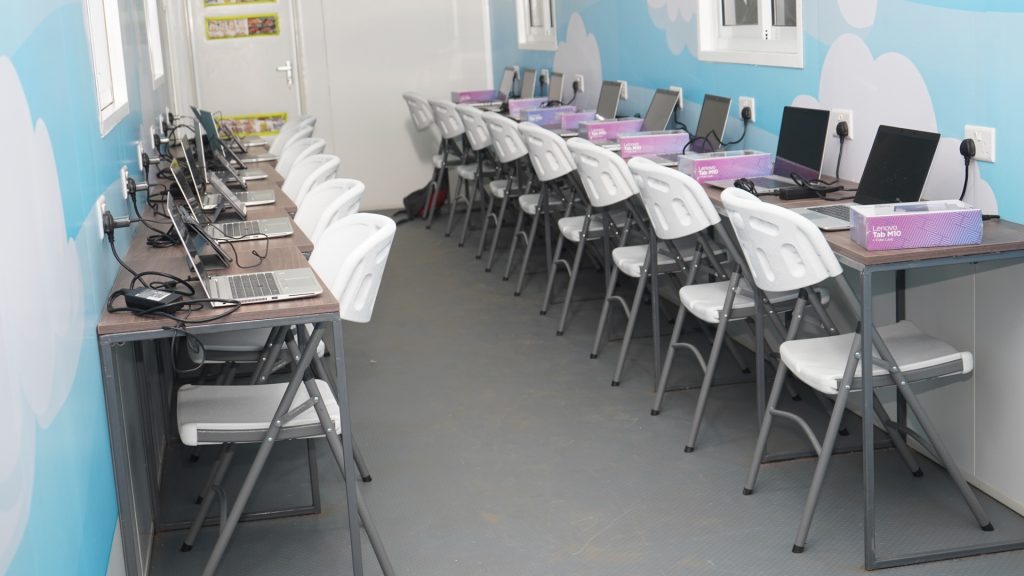Access to Internet connectivity in rural Sierra Leone is limited and expensive. According to the International Telecommunication Union (ITU), only 21.3% of households have Internet access via a fixed or mobile network, and only 5.6% of homes have a computer. According to Media Matters for Women, very few people, most of whom are men, can afford mobile phones.
Digitruck Salone aims to address this challenge by bringing rural women and girls online. Close the Gap International, in partnership with Media Matters for Women, transformed a 40ft refurbished shipping container into a mobile state-of-the-art digital classroom with connectivity that is entirely self-sustainable and can reach remote locations. Equipped with 60 laptops and 30 tablets, the Digitruck Salone allows a large number of women and youth to be trained simultaneously.
“We believe that education is power. If girls have access to the Internet and understand its safe and effective use, that will broaden their horizons and provide an opportunity to tap into the educational potential that access to the Internet brings,” highlights Alinah Kallon, Media Matters for Women Program Manager.
With funding from the Internet Society Foundation’s BOLT grant, 300 students and 30 business women entrepreneurs in rural communities in three districts of Sierra Leone will gain digital inclusion and social empowerment that will improve their lives.

Internet Society Foundation: The project focuses on reaching students and rural businesswomen. Why is it important to target these particular demographics? What unique opportunities will the Digitruck Salone program offer to empower young people and female entrepreneurs?
Alinah Kallon: Our focus for young people is mostly on opportunities to further their education. Education is power, and rural girls’ drop-out rates are high after junior secondary school. If girls have access to the Internet and understand its safe and effective use, that will broaden their horizons and provide an opportunity to tap into the educational potential that access to the Internet brings. When we teach them how to use computers and the Internet, they will no longer be limited to the few common entertainment uses in their communities. We will be exposing them to opportunities that are beyond the confines of their village. The trainees will be allowed to use apps relevant to their education and business. For those who dream of attending university, they will understand how to search for scholarship opportunities—and how the Internet can positively impact their future.
Our female entrepreneurs have a range of business interests—from agriculture to petty trading to clothing design and sale. We are moving into a world of cashless transactions, and those without the capability to use and understand this will be left behind. Our training will include the basics of accessing funds electronically and an opportunity for them to learn basic spreadsheets that will help them manage their finances and track their transactions, income, and expenditures.
We want to encourage entrepreneurs to use the banking system. EcoBank, one of the largest banks in Africa and Sierra Leone, has expressed an interest in partnering with us to help entrepreneurs utilize loan facilities and understand how to open and use a bank account. We expect that the knowledge gained by our trainees will be shared through their women’s networks, the knowledge being passed on to their friends and business colleagues. All of our trainees belong to the Women Trader’s Association, where they share experiences, so we expect that the knowledge gained through Digitruck Salone will benefit our trainees and improve the overall business environment for rural women.

Internet Society Foundation: A key aspect of the project is the inclusion of mobile-first digital literacy training. Can you explain how this approach will benefit participants, particularly those who may not have access to traditional computers?
Alinah Kallon: Most rural women and girls cannot afford a computer or tablet. Mobile phones are more accessible and affordable, and thus, they are a better and more realistic option for our beneficiaries. Digitruck Salone will provide an opportunity for our trainees to learn digital literacy skills on larger devices, but we understand that they will have limited access to those devices going forward.
Because of this reality, in Sierra Leone, we use our phones for everything—document production, spreadsheets, etc. The skills learned on the larger devices will have an app version on the mobile phones. Our goal is for all trainees to be able to use the mobile phones effortlessly. As part of the program for the entrepreneurs, they will be given a smartphone and a year of data to move their business forward after they have completed the training.
Internet Society Foundation: The project plans to track the program’s success through various indicators. Can you share some examples of the skills and knowledge you hope participants will gain from the Digitruck Salone training? How is the program being received in the target population?
Alinah Kallon: The Digitruck was built and arrived in Sierra Leone in late April. The first cohort of trainees started in early May. The students and entrepreneurs have been selected, and they are excited and anxiously awaiting its arrival. They know that the Internet is a useful tool, but they do not yet understand or have the basic knowledge to use it effectively.
The training will help them understand the usefulness of the internet and provide the basic skills—internet safety, keyboarding, app use, etc.—that will spark their desire to learn further.
Only two of our participating schools have access to computers in their buildings. When we asked how they use the computers, we learned that they use them for watching movies. Digitruck Salone will open a new world of awareness and opportunities for these students and also for the participating schools—the ability to improve their creative skills, to use the internet to learn how to do new things and find new opportunities, how the internet can help with one’s education, etc.
Internet safety is a key component of our training. Trainees will gain the ability to browse the Internet safely and to take advantage of the opportunities that access to information brings. They will be able to take precautions because we will train them on digital literacy and safety.
Internet Society Foundation: Can you describe how the BOLT grant is helping you to impact your target population?
Alinah Kallon: This grant is really helping us reach our target population with something very new. We are serving communities with no electricity and no Internet connectivity. Many don’t know how to use a smartphone. They will be learning something entirely new and this will create the desire to learn more.
If we succeed here, we believe it also will encourage other organizations to focus their attention on the rural communities which is really important because these are the most underserved areas in our country. If we can show how Internet access can lift up rural communities, we believe that Digitruck Salone will have a positive impact well beyond the advantage that will be given to the trainees.
